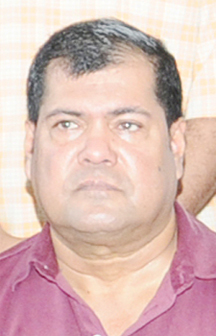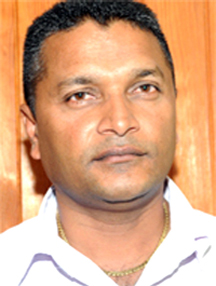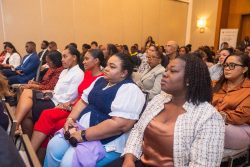Asks Marlon Munroe
Cricket is back in court.
For how long however, is yet to be ascertained.
On Thursday Chief Justice Ian Chang granted an order restraining the two-week old executive, led by Ramsey Ali, from performing any duties on behalf of the Guyana Cricket Board (GCB). This decision now leaves more questions than answers.
Angela Haniff, in her capacity as Secretary of the Berbice Cricket Board, a constituent member of the GCB, and a delegate of the BCB at the Annual General Meeting of the GCB that was held on July 10, brought the action against the new executive.
The action was brought against Ali, Fizul Bacchus, Alfred Mentore, Anand Sanasie, Dru Bahadur, Anand Kalludeen, Colin Europe, Troy Mendonca, Terrence Holder, Rayon Griffith, Nazimul Drepaul, Chetram Singh and Lionel Jaikaran.
This latest action leaves Guyana’s cricket out on a limb.
The rubble, created by corruption, greed and discontentment, has become even more difficult for Guyana’s cricket to thrive.
Chang also ordered that the previous divided executive, headed by Singh since 1991, be reinstated until the matter is called again on July 29.
Why?

One would have expected a more informed judgement to come from beyond the hallowed walls of the Court. Why wasn’t an Interim Management Committee (IMC) ordered to be formed? Was the reinstatement of the old executive a move of expediency because of the short period of time until the matter is called again?
Will a sounder ruling come on July 29? Or can we expect the saga of the Demerara Cricket Board (DCB), which is currently temporary defunct? Both factions of that Board were ordered to desist from acting in the capacity of executive after both factions had held separate elections earlier this year.
This came about after the same court had ordered the Bissoondyal Singh and Raj Singh/Anand Sanasie-led factions to call an Ordinary General Meeting (OGM) to iron out the issues affecting the Board prior to the staging of elections. This was the redress the court gave two feuding factions and the result was: separate elections and eventually a non-functioning entity that would see cricket in Demerara with a question mark over it.
What is the purpose of the court, one might ask? The issues reached the court in the first place because the factions were hell-bent on not trying to see the bigger picture: cricket and its development. They thought the court would have seen that picture based on the arguments put forward by the lawyers.
These are the levels to which cricket has sunk in Guyana.
Further, there is a deafening silence, or is it political ploy, from the government, especially the president of Guyana, Bharrat Jagdeo. Jagdeo, seems to have become an authority on what is needed for the resuscitation of West Indies cricket but yet turns a blind eye to the situation that should foremost be of concern to him. Does he not have an opinion on what is needed to stop the madness that is playing out right before his eyes in his own backyard? Does not President Jagdeo wish to see Guyana’s cricket rise from it current ashes the same way he has been calling for the WI? Or the wisdom that if the territorial boards are strong, WI cricket will be strong has not caught on just yet by the president and power-hungry cricket board officials in Guyana?

The GCB elections have been mired in controversy long before July 10 at the Georgetown Cricket Club (GCC) pavilion and accusations spewed from all angles about what will play out and whether it would have been properly constituted. Certainly the most damning allegation was that officials were trying to “hijack the electoral process” should have merited some sort of intervention from some corner.
This was in addition to the allegations of financial impropriety repeatedly pointed out by members of the board, the arbitrary use of two constitutions to serve whatever agendas and schemes and many other excesses. Yet, there were no placards bearing messages that the “GCB is a national disgrace”.
Ali and his band of executives were elected unopposed and under controversial circumstances. Media operatives were barred from the AGM and elections, for fear of scrutiny to what was being perpetuated. The message was clear as day, nonetheless. No less than two boards should contest the elections of the GCB and 14 members are needed to constitute a quorum rather than the 12 that was even being peddled by even Singh, a veteran cricket administrator for over three decades. Ten delegates voted: nine from Essequibo and one from Berbice while the four others


that left after the meeting was said to have abstained from voting.
Singh clearly wanted to be rid of the poisoned chalice that had become the GCB presidency and certainly must be ruing his decision in 2009 to run for one last term. But he is back in the hot seat and, by his own admission, with an executive that he “could not have stamped his authority over after he got sick last year.”
The one delegate from Berbice on the other hand, David Blacks, who is also the vice president of the Berbice Cricket Board (BCB) and went against the decision of his board to not to participate in the GCB elections, will know his fate on August 14. He is facing disciplinary action by the General Council of the BCB.
Meanwhile,the new GCB had named committees and sub-committees but they will have to wait a little while longer to see whether they will be allowed to function.
But the hot button questions will be whether better sense will prevail this time around as it relates to GCB or whether Guyana’s custodian of cricket will become like the DCB?





